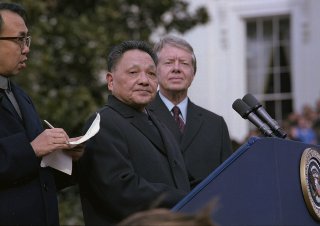How Deng Xiaoping Solved China’s Trade Problem—and What America Can Learn from Him
More than at any point in contemporary history, China sees itself as a strong power. Now aware of China’s monumental presence on the world stage, Western elites can take a leaf from Deng Xiaoping and relearn how to exploit trade policy.
AS THE 1980s progressed, China grew quietly and patiently through access to the American markets, technology, and expertise that Deng had secured. After Jimmy Carter left office, America elected Ronald Reagan, who was evidently uninterested in reversing Carter and Deng’s deal and instead focused on the threat to American security from the Soviet Union. This was not a problem for China, which, despite being ideologically aligned, had decoupled from its alliance with the Soviet Union in the 1960s for geopolitical reasons.
American economic fears in the 1980s centered on rapidly-growing Japan, rather than China. This must have provided no end of satisfaction to China, as not only were they ignored, but the focus was on their regional competitor. Ironically, the only reason Japan was able to economically threaten the U.S. economy was because the United States had forcibly opened its economy to foreign trade twice, once in the nineteenth century thanks to Commodore Matthew C. Perry, and then again after the American invasion of Japan in World War II. Japanese business leaders zealously took up methods for economic efficiency originally developed by American engineers and consultants in the aftermath of the war.
Deng gambled that the West had won against the rest of the world with trade for so long that it had forgotten how powerful it could be if the situation was reversed. He gambled that the West was too ideologically blinded by the Cold War to view China as a security threat and too ideologically blinded by free-market ideology to realize that free trade with China was a losing bet. Much like sixteenth-century Mongolia could grow from trade with China to gain an absolute advantage, so China could do the same with America. But rather than keep China blockaded as the Ming Dynasty did to Altan Khan, the United States gladly opened up to China. All it took was some clever public relations work on the part of Deng.
The experience of the West, where wealth led to liberal democracy, is historically contingent and will not reoccur in China. More than at any point in contemporary history, China sees itself as a strong power. Once China’s GDP surpasses America’s, the CCP will effectively enjoy infinite legitimacy at home. It would take foreign military intervention to topple the regime to stop China from being authoritarian and communist. But unlike Japan, China cannot be invaded. Instead, now aware of China’s monumental presence on the world stage, Western elites might take a leaf from Deng Xiaoping and relearn how to exploit trade policy.
Samo Burja is the Founder and President of Bismarck Analysis, a consulting firm that investigates the political and institutional landscape of society. He is also a Research Fellow at the Long Now Foundation, where he studies how institutions can endure for centuries and millennia, and a Senior Research Fellow in Political Science at the Foresight Institute, where he advises how institutions can shape the future of technology.
Image: Wikimedia Commons

